Hard and soft skills combine to create a well-rounded pastry chef who can produce consistently exceptional pastries while maintaining a positive and efficient kitchen environment.
This article covers the personal qualities or soft skills that a pastry chef needs to excel in their career, focusing on the value of soft skills and how to develop them.
We encourage you to read our article on the hard skills needed to be a pastry chef and how to develop them.
Table of Content:
- Attention to Detail for quality, consistency and aesthetics.
- Creativity and Innovation to Develop New Recipes.
- Patience for the Time-Consuming Intricacies in Pastry Making.
- Time Management to Finish Multiple Tasks within Time Limits.
- Being Adaptable and Flexible to Changing Situations.
- Teamwork for Collaboration and Smooth Kitchen Operations.
- Communication to Convey Instructions Accurately.
- Multitasking to Meet High Volume Demands and Maximise Time.
- Problem-Solving and Resourcefulness to Handle Arising Issues.
- Organisation to Streamline Workflow.
- Precision for Consistent Quality Results.
- Passion for Baking for Drive and Commitment to Excellence.
- Openness to Accept Constructive Feedback to Grow.
- Customer Service to Build a Good Reputation and Brand Image.
- Manual Dexterity for Intricate Decorating and Precision.
- Physical Endurance to Cope with High Pressure.
- Mental Endurance for Focus and Resilience Under Pressure.
- Leadership to Inspire, Guide and Streamline Workflow.
- Strategic Thinking to Analyse, Plan, and Make Good Decisions.
- Productivity for Optimal Performance and Meet High Demands.
- Willingness to Learn to Improve Skills Continuously.
- Culinary Trends Research to Include New Trends in Designs.
Pastry Chef Soft Skills: Their Value and Developing Them.
Attention to Detail for Quality, Consistency and Aesthetics.
Pastry chefs must have a keen eye for detail, paying close attention to measurements, cooking times, decorating and presentation details. They must focus meticulously on every aspect of the pastry-making process, from precise measurements to intricate decorations, to deliver consistent quality and visually appealing creations.

Importance of Attention to Detail for Pastry Chefs:
Consistency in Quality: Pastry chefs need to replicate recipes accurately to maintain consistent taste and texture in their pastries, earning the trust and loyalty of customers.
Aesthetically Pleasing Presentation: Paying close attention to details in decorating pastries enhances their visual appeal, enticing customers and elevating the overall dining experience.
Minimising Errors and Waste: Precision in measurements and techniques minimises errors and reduces ingredient waste, leading to efficient kitchen operations and cost-effectiveness.
Guidelines to Develop Attention to Detail:
Follow Recipes Carefully: Adhere to recipes meticulously, double-checking measurements and ingredients to ensure accuracy.
Engage in Regular Self-Assessment: Routinely evaluate pastries and techniques to identify areas for improvement in attention to detail.
Practice Delicate Decorating Techniques: Hone decorating skills through regular practice to enhance precision and artistic flair.
Use Checklists and Timers: Utilize checklists and kitchen timers to stay organised and focused during pastry preparation, reducing the likelihood of overlooking essential steps.
Creativity and Innovation to Develop New Recipes.
Pastry chefs should possess a creative and innovative flair to develop new recipes, designs, and unique flavour combinations.
They must be able to think imaginatively, inventively, and outside the box, developing unique and captivating pastry creations that push the boundaries of traditional dessert-making.
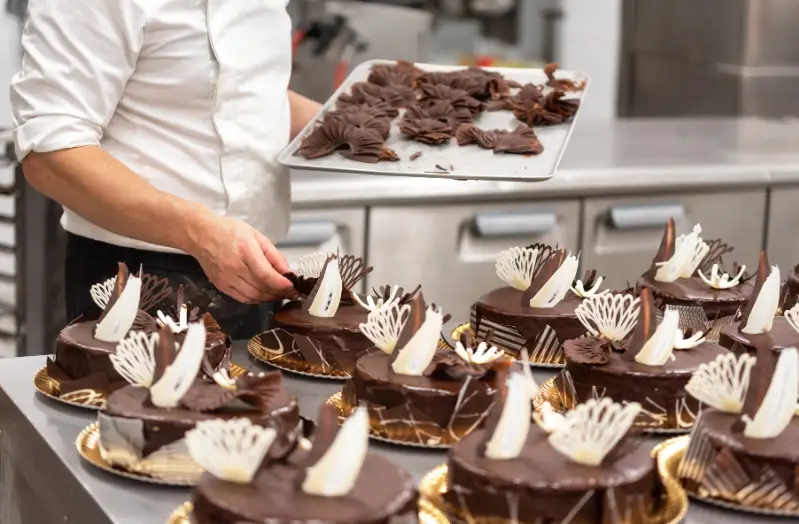
Importance of Creativity and Innovation for Pastry Chefs:
Distinctive Offerings: Infusing creative ideas into pastry recipes and designs sets pastry chefs apart, attracting customers seeking new and exciting dining experiences.
Menu Differentiation: Innovation allows pastry chefs to continuously update and diversify their menus, keeping patrons engaged and eager to explore new selections.
Inspires Culinary Trends: Pioneering new flavour combinations and artistic presentations can influence broader culinary trends, garnering recognition and establishing the pastry chef as a trendsetter in the industry.
Guidelines to Develop Creativity and Innovation:
Experiment with Unconventional Ingredients: Challenge conventional norms by exploring unique and lesser-known ingredients to discover innovative pairings and flavours.
Seek Inspiration from Various Sources: Draw inspiration from different cultures, art forms, and nature to infuse fresh ideas into pastry designs and presentations.
Collaborate and Exchange Ideas: Engage in culinary collaborations with other chefs or participate in workshops to exchange insights and stimulate creative thinking.
Encourage Continuous Learning: Attend industry events, workshops, and seminars to stay updated on emerging pastry trends and techniques, fostering continuous growth and inspiration.
Patience for the Time-Consuming Intricacies in Pastry Making.
Pastry-making often requires precise techniques and multiple steps, necessitating patience. Patience encompasses a pastry chef’s ability to remain composed and steadfast throughout the intricate and time-consuming pastry-making process, from mixing and proofing dough to delicate decorating.
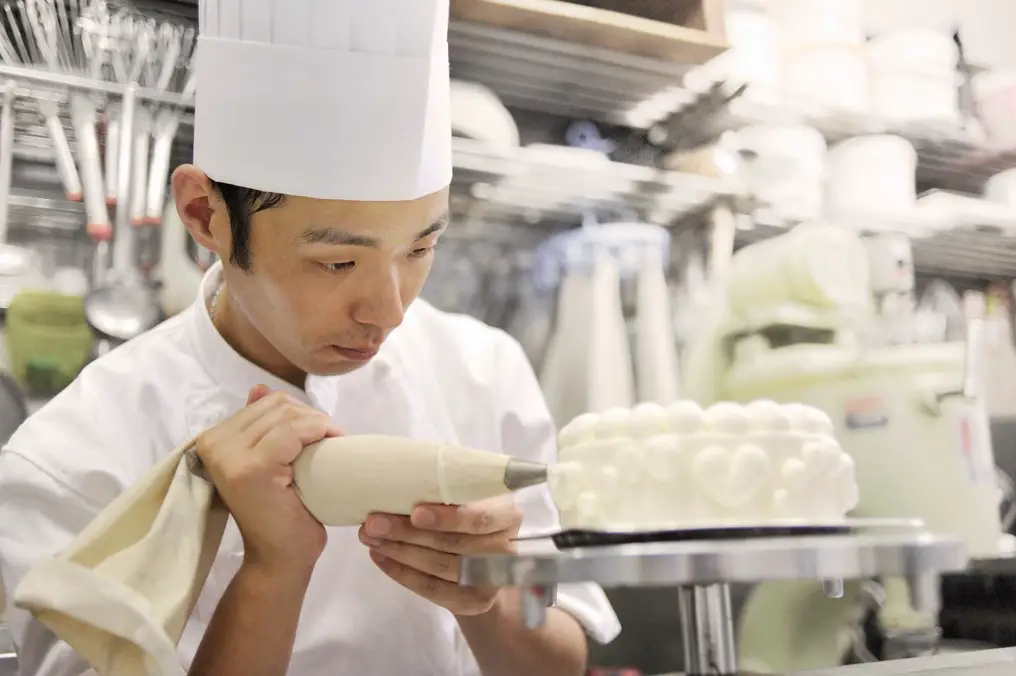
Importance of Patience for Pastry Chefs:
Precision in Techniques: Pastry-making demands precise techniques that may require repeated attempts, making patience essential for achieving consistent and refined results.
Complex Pastry Preparations: Many pastries involve multi-step processes that require adequate time for proofing, chilling, or fermenting, where patience ensures the best outcome.
Creativity and Experimentation: Developing innovative recipes or unique decorations often requires trial and error, where patience allows pastry chefs to embrace the learning curve and refine their creations.
Guidelines to Develop Patience:
Mindful Breathing: Practice deep breathing exercises during stressful moments in the kitchen to regain composure and patience.
Set Realistic Expectations: Pastry-making can be time-consuming, and perfection may require multiple attempts.
Learn from Mistakes: Embrace mistakes as learning opportunities, using them to improve techniques and develop resilience.
Celebrate Small Victories: Recognize and appreciate the incremental progress made during pastry preparation, fostering a positive and patient mindset.
Time Management to Finish Multiple Tasks within Time Limits.
Pastry chefs should be skilled in managing their time efficiently to complete multiple tasks within deadlines.
They must be able to allocate time efficiently, prioritise tasks, and meet deadlines, ensuring the smooth execution of pastry-making processes and maintaining kitchen productivity.
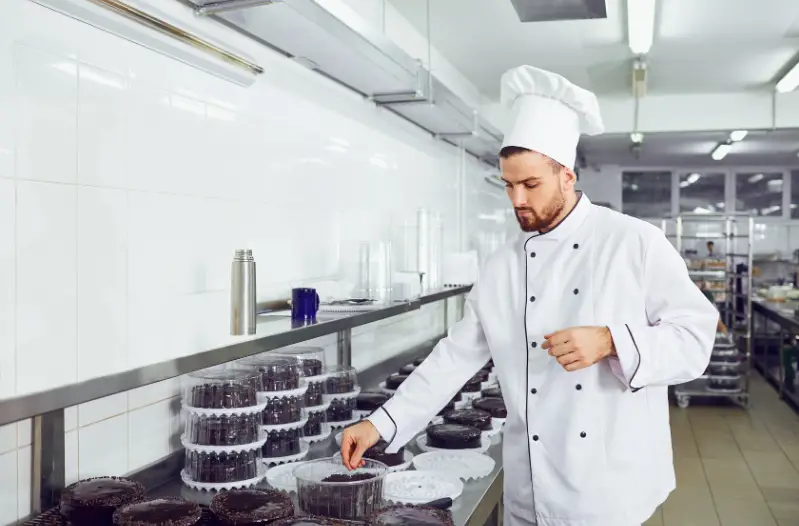
Importance of Time Management for Pastry Chefs:
Optimal Workflow: Effective time management streamlines pastry-making, reducing delays and ensuring efficient kitchen operations.
Meeting Customer Demands: Timely preparation and delivery of pastries are crucial in meeting customer expectations and providing exceptional service.
Consistent Quality: Proper time allocation allows pastry chefs to focus on each step with adequate attention, contributing to the consistent quality of pastries.
Guidelines to Develop Time Management:
Use Time-Tracking Tools: Utilise timers and kitchen schedules to allocate time effectively for each task during pastry preparation.
Prioritise Tasks: Identify and prioritise essential tasks based on deadlines and complexity to manage time efficiently.
Plan and Organise: Create daily or weekly schedules outlining the sequence of pastry preparation to optimise time usage and reduce stress.
Being Adaptable and Flexible to Changing Situations.
Pastry chefs must be flexible, adaptable, and accommodate unexpected situations in a fast-paced kitchen environment.
This entails a pastry chef’s readiness to adjust to changing circumstances, embrace new challenges, and modify approaches in response to evolving kitchen dynamics and customer preferences.
Importance of Flexibility and Adaptability for Pastry Chefs:
Handling Seasonal Variations: Pastry chefs encounter seasonal ingredient availability and fluctuating customer demands. Flexibility allows them to create diverse offerings that cater to changing tastes and ingredient availability.
Dealing with Unexpected Challenges: The fast-paced kitchen environment can present unexpected challenges, such as equipment malfunctions or last-minute menu changes. Adaptability enables pastry chefs to respond swiftly and find innovative solutions.
Embracing Culinary Trends: The culinary world continuously evolves with new trends and techniques. Being flexible and adaptable empowers pastry chefs to incorporate innovative flavours and designs, staying relevant and appealing to a dynamic market.
Guidelines to Develop Flexibility and Adaptability:
Embrace a Growth Mindset: Cultivate a positive attitude towards learning and view challenges as opportunities for growth and improvement.
Seek Diverse Experiences: Work in various kitchen settings, such as restaurants, bakeries, and pastry shops, to expose yourself to different approaches and styles.
Experiment with New Techniques: Stay updated with the latest pastry trends and experiment with novel techniques to enhance your repertoire.
Be Open to Feedback: Accept constructive feedback gracefully, as it can offer valuable insights and foster adaptability to refine your skills and creations.
Teamwork for Collaboration and Smooth Kitchen Operations.
Teamwork is vital for a pastry chef and refers to their ability to collaborate effectively with kitchen staff and fellow bakers, fostering a harmonious and efficient kitchen environment to achieve collective culinary success.
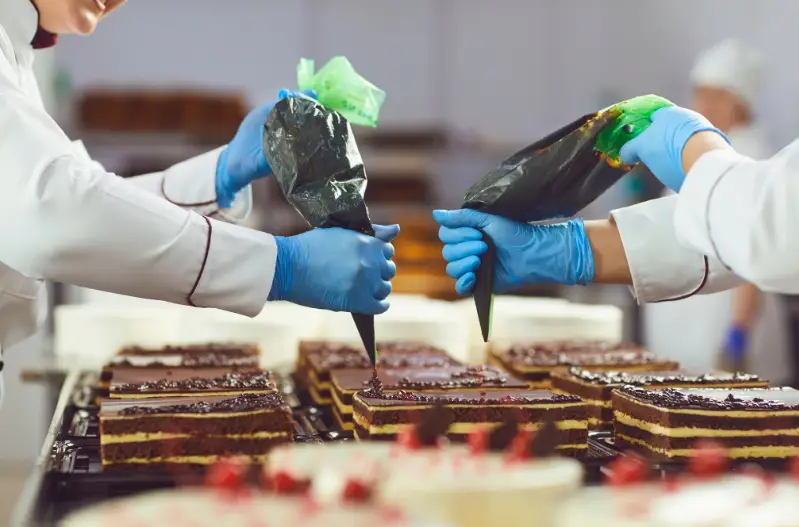
Importance of Teamwork for Pastry Chefs:
Efficient Kitchen Operations: Effective teamwork streamlines communication and task delegation, ensuring smooth coordination in the kitchen and minimising delays during pastry preparation.
Diverse Skill Utilization: Teamwork allows pastry chefs to leverage their colleagues’ diverse talents and expertise, leading to a dynamic and innovative approach to pastry-making.
Supportive Work Environment: A culture of teamwork promotes mutual respect, trust, and camaraderie among kitchen staff, leading to increased job satisfaction and higher productivity.
Guidelines to Develop Teamwork:
Active Communication: Engage in open and honest communication with colleagues, expressing ideas and concerns constructively while actively listening to others.
Offer Assistance: Be proactive in offering help to team members when they face challenges, fostering a supportive and collaborative atmosphere.
Celebrate Team Achievements: Acknowledge and appreciate the team’s collective efforts, recognising their contributions to successful pastry creations.
Resolve Conflicts Amicably: In disagreements or conflicts, address the issues calmly and find resolutions through compromise, seeking the common goal of exceptional pastry-making.
Communication to Convey Instructions Accurately.
Communication is a vital personal quality for a pastry chef for the effective exchange of information, ideas, instructions, and feedback with kitchen staff, team members, and customers.
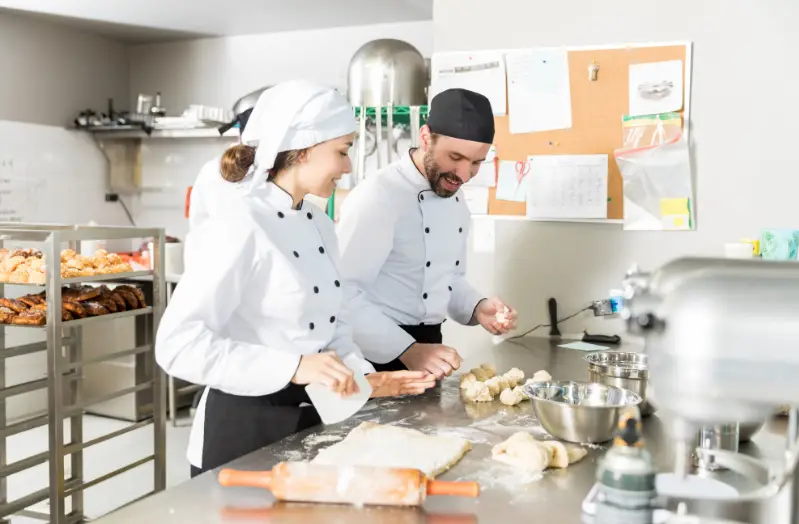
Importance of Communication for Pastry Chefs:
Precision in Recipe Execution: Clear communication ensures that instructions for pastry recipes are conveyed accurately, reducing the risk of errors and maintaining consistent quality.
Seamless Kitchen Collaboration: Effective communication fosters a cohesive kitchen environment where pastry chefs can work harmoniously with other team members, enhancing productivity and workflow.
Customer Satisfaction: Clear communication with customers allows pastry chefs to understand their preferences and dietary needs, providing personalised recommendations and enhancing the overall dining experience.
Guidelines to Develop Communication:
Practice Active Listening: Give full attention to what others are saying, ask clarifying questions, and respond thoughtfully to show genuine interest in the conversation.
Use Clear and Concise Language: Avoid jargon or complicated terminology, express ideas succinctly, and ensure that instructions are easy to understand for all parties involved.
Seek Feedback and Be Open to Input: Encourage feedback from colleagues and customers, valuing their insights and using them constructively to improve pastry offerings.
Enhance Non-Verbal Communication: Pay attention to body language and facial expressions, ensuring your non-verbal cues convey approachability and receptiveness during interactions.
Multitasking to Meet High Volume Demands and Maximise Time.
Multitasking is a crucial soft skill for a pastry chef, involving the ability to handle multiple tasks and responsibilities simultaneously, optimising productivity and efficiency in the fast-paced kitchen.
Importance of Multitasking for Pastry Chefs:
Meeting High-Volume Demands: In busy kitchens or during peak hours, multitasking allows pastry chefs to manage numerous orders and tasks efficiently, ensuring timely delivery of pastries to customers.
Maximising Time and Resources: Multitasking optimises time usage and resource allocation, enabling pastry chefs to balance various aspects of pastry preparation without compromising quality.
Adapting to Dynamic Kitchen Environments: The dynamic nature of the kitchen demands the ability to multitask seamlessly, accommodating changing priorities and unexpected situations.
Guidelines to Develop Multitasking:
Prioritise Tasks: Identify tasks based on urgency and importance, tackling high-priority items first to maintain productivity.
Focus on One Task at a Time: While multitasking is essential, it is equally crucial to concentrate on individual tasks to ensure accuracy and minimise errors.
Use Digital Tools: Leverage digital tools like kitchen management software and task organisers to streamline and coordinate tasks effectively.
Practice Regularly: Engage in multitasking exercises during quieter periods in the kitchen, gradually building proficiency and confidence in handling multiple responsibilities.
Problem-Solving and Resourcefulness to Handle Arising Issues.
Pastry chefs need to think critically to troubleshoot issues arising during baking.
Hence, problem-solving and resourcefulness are invaluable qualities for a pastry chef, encompassing the ability to think critically, find creative solutions, and adapt to challenges while utilising available resources effectively.
Importance of Problem Solving and Resourcefulness for Pastry Chefs:
Efficient Troubleshooting: Pastry chefs encounter various challenges in the dynamic kitchen environment, such as ingredient shortages or equipment malfunctions. Problem-solving skills enable them to address these issues swiftly, minimising disruptions to the pastry-making process.
Innovation in Pastry Creation: Resourcefulness allows pastry chefs to make the most of available ingredients, finding inventive ways to craft delicious pastries even with limited resources, fostering culinary ingenuity.
Adaptability to Customer Preferences: Problem-solving skills empower pastry chefs to cater to customer preferences and dietary restrictions, creating customised pastry offerings that exceed expectations.
Guidelines to Develop Problem-Solving and Resourcefulness:
Seek Diverse Solutions: Approach problems from different angles, considering various approaches to find the most effective solution.
Learn from Experienced Chefs: Engage with experienced chefs and colleagues to gain insights and learn problem-solving techniques for pastry-making.
Experiment with Ingredient Substitutes: Practice using alternative ingredients to expand your resourcefulness and develop the ability to adapt recipes creatively.
Maintain a Curious Mindset: Embrace curiosity and a willingness to explore new methods, ingredients, and techniques, fostering continuous improvement and innovation in pastry creations.
Organisation to Streamline Workflow.
Pastry chefs must keep their workstations tidy and maintain an organised kitchen to optimise efficiency. They must efficiently arrange tasks, ingredients, and tools to maintain a systematic and structured approach to pastry preparation.
Importance of Being Organised for Pastry Chefs:
Minimising Errors: An organised workspace reduces the likelihood of mistakes during pastry-making, ensuring consistent quality in the final products.
Time Management: Being organised enables pastry chefs to optimise time usage, meet deadlines and efficiently handle high-volume orders.
Streamlining Workflow: Organised kitchen operations enhance productivity, allowing pastry chefs to focus on the creative aspects of pastry preparation while reducing unnecessary stress and distractions.
Guidelines to Develop Being Organised:
Create an Organisational System: Develop a system for arranging tools, ingredients, and recipes in the kitchen, ensuring easy accessibility and minimising clutter.
Utilise Checklists and Schedules: Implement checklists for daily tasks and schedules for time-sensitive activities to maintain structure and order in the kitchen.
Regularly Clean and Tidy Workstations: Dedicate time to clean and organise workstations after each task or shift, promoting a neat and functional environment.
Practice Time Blocking: Allocate specific time slots for various pastry-making tasks, ensuring a balanced and organised workflow throughout the day.
Precision for Consistent Quality Results.
Precision is a critical quality for a pastry chef and encompasses the accurate and meticulous execution of measurements, techniques, and decorating, ensuring consistent and high-quality baking and pastry creations.
Importance of Precision for Pastry Chefs:
Consistent Taste and Texture: Precise measurements and techniques lead to consistent taste and texture in pastries, meeting customer expectations and building a loyal clientele.
Artistic Presentation: Precision in decorating enables pastry chefs to achieve intricate designs, enhancing the visual appeal of pastries and elevating their overall presentation.
Minimising Ingredient Waste: Accurate measurements reduce ingredient waste, contributing to cost-effectiveness and sustainability in the kitchen.
Guidelines to Develop Precision:
Use Digital Scales and Measuring Tools: Invest in accurate measuring tools to ensure precise measurements of ingredients during pastry preparation.
Follow Standardised Recipes: Adhere to standardised recipes, carefully following the instructions and techniques to achieve consistent results.
Practice Decorating Techniques: Hone decorating skills through regular practice, focusing on precision and attention to detail to perfect artistic presentations.
Conduct Self-Evaluation: Regularly assess your pastry creations for taste, texture, and appearance to identify areas for improvement and refine your precision.
Passion for Baking for Drive and Commitment to Excellence.
A genuine passion for baking and pastry is a fundamental personal quality that drives a pastry chef’s dedication, creativity, and commitment to excellence in their craft.

Importance of Passion for Baking and Pastry for Pastry Chefs:
Sustained Motivation: A genuine passion for baking fuels a pastry chef’s motivation, inspiring them to continuously improve their skills and experiment with new recipes and techniques.
Innovation and Creativity: Passion drives pastry chefs to think outside the box, pushing the boundaries of traditional pastry-making and infusing their creations with a unique and artistic flair.
Customer Satisfaction: Passionate pastry chefs infuse their creations with love and enthusiasm, translating into exceptional taste and presentation, delighting customers and fostering loyalty.
Guidelines to Develop a Passion for Baking and Pastry:
Explore Various Desserts: Experiment with different pastries and desserts to discover which styles resonate most with your taste and creativity.
Seek Inspirations and Learning Opportunities: Immerse yourself in baking by reading books, attending workshops, and following renowned pastry chefs for inspiration and continuous learning.
Engage in Pastry Projects: Undertake personal pastry projects and challenges to foster a deep connection with the craft and reinforce your passion.
Share Your Creations: Share your pastry creations with friends, family, and colleagues, and seek feedback to boost your enthusiasm and refine your skills.Top of Form
Openness to Accept Constructive Feedback to Grow.
Openness to feedback is a crucial attribute for a pastry chef, involving the willingness to receive and embrace constructive criticism, suggestions, and insights from colleagues, customers, and mentors.
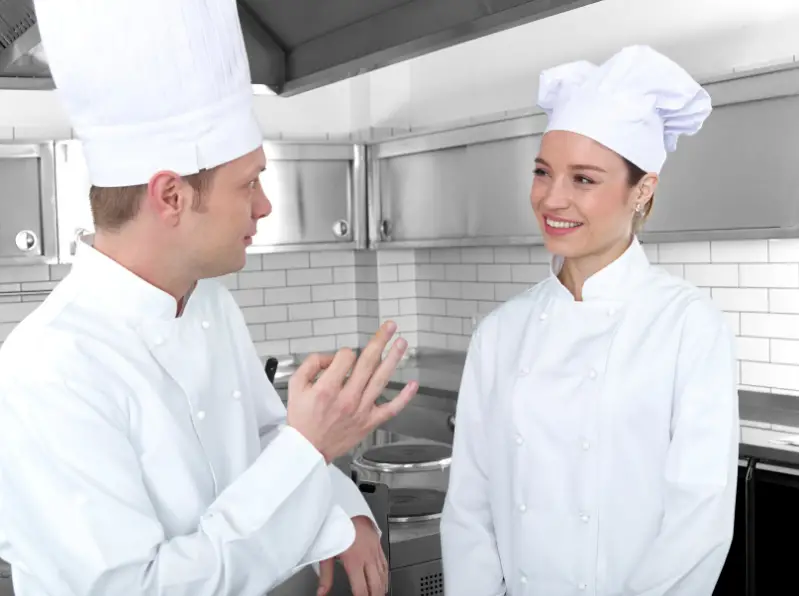
Importance of Openness to Feedback for Pastry Chefs:
Continuous Improvement: Embracing feedback allows pastry chefs to identify areas for improvement, refine their skills, and elevate the quality of their pastries.
Customer Satisfaction: Being open to customer feedback enables pastry chefs to understand their preferences and tailor their creations to meet customer expectations, fostering loyalty and satisfaction.
Professional Growth: Feedback from experienced chefs and mentors provides valuable insights and mentorship, supporting a pastry chef’s professional development and expertise.
Guidelines to Develop Openness to Feedback:
Cultivate a Growth Mindset: Embrace the belief that feedback is an opportunity for growth and learning rather than a critique of your abilities.
Ask for Feedback: Seek feedback proactively from colleagues, customers, and mentors, inviting them to share their thoughts and suggestions on your pastry creations.
Practice Active Listening: During feedback sessions, practice active listening, fully absorbing the comments and avoiding defensive responses.
Implement Constructive Feedback: Act on constructive feedback by incorporating the suggestions into your pastry-making process, demonstrating your openness to improvement and commitment to excellence.
Customer Service to Build a Good Reputation and Brand Image.
Pastry chefs in customer-facing roles should possess strong customer service skills. This vital interpersonal quality, encompasses the ability to provide exceptional assistance, address customer needs, and create memorable dining experiences through delightful pastries and interactions.

Importance of Customer Service for Pastry Chefs:
Customer Loyalty and Referrals: Outstanding customer service fosters customer loyalty and positive word-of-mouth, attracting new patrons to the pastry establishment.
Personalised Offerings: Pastry chefs skilled in customer service can engage with patrons, understanding their preferences and creating personalised pastry recommendations that leave a lasting impression.
Building a Positive Reputation: Excellent customer service contributes to a positive reputation for the pastry chef and their establishment, enhancing the brand image and drawing repeat business.
Guidelines to Develop Customer Service:
Exceed Customer Expectations: Go above and beyond to exceed customer expectations, surprising them with unique pastry creations or attentive gestures.
Active Communication: Engage in attentive and friendly communication with customers, making them feel valued and comfortable while visiting the pastry shop.
Handle Feedback Gracefully: Embrace feedback, both positive and negative, with grace and professionalism, using it as an opportunity to improve and tailor pastry offerings.
Cultivate Empathy: Put yourself in the customer’s shoes, empathise with their needs and preferences, and use this understanding to enhance their overall experience.
Manual Dexterity for Intricate Decorating and Precision.
Manual dexterity and fine motor skills are crucial for a pastry chef, encompassing the precise control and coordination of hand movements required for delicate pastry techniques and artistic presentations.
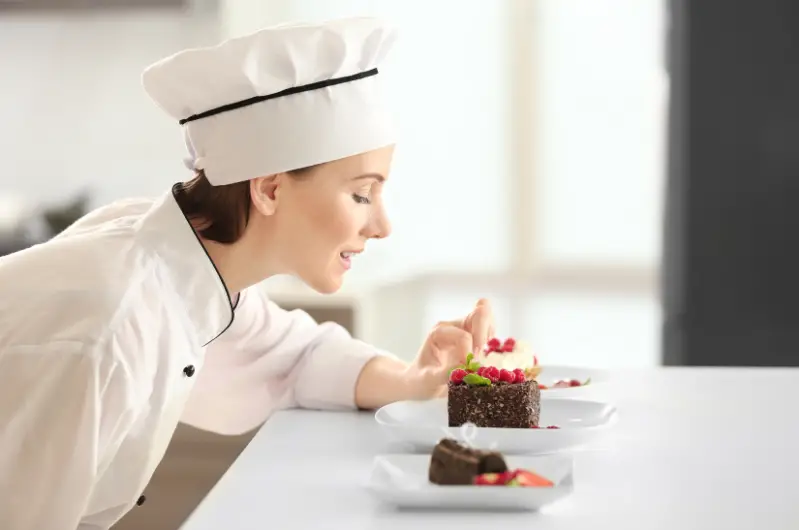
Importance of Manual Dexterity and Fine Motor Skills for Pastry Chefs:
Intricate Decorating Techniques: Pastry chefs with excellent manual dexterity can create intricate designs and decorations, enhancing the visual appeal of their pastries and elevating their overall presentation.
Precision in Pastry Crafting: Fine motor skills enable pastry chefs to handle delicate tasks like piping, garnishing, and intricate dough handling, ensuring precise and consistent results.
Attention to Detail: The ability to manoeuvre tools with precision allows pastry chefs to pay close attention to detail, maintaining consistent quality in their pastry creations.
Guidelines to Develop Manual Dexterity:
Regular Practice: Engage in the regular practice of pastry techniques that require manual dexterity, such as piping, shaping, and sculpting dough.
Use Various Tools: Familiarize yourself with various pastry tools and practice using them to develop dexterity in handling different equipment.
Hand Exercises: Perform hand and finger exercises to improve strength and flexibility, enhancing fine motor skills.
Observe and Learn: Observe experienced pastry chefs during their work to learn from their techniques and incorporate their methods into your practice.
Physical Endurance to Cope with High Pressure.
Pastry chefs need considerable physical strength and stamina to cope with the profession’s demands, especially in a busy, commercial kitchen. Pastry chefs often work long hours and must possess physical endurance to withstand the profession’s demands.
Importance of Physical Endurance for Pastry Chefs:
A pastry chef’s daily tasks involve working with heavy equipment such as industrial mixers, dough rollers, and ovens. Lifting and manoeuvring these items require physical strength to prevent injuries and maintain kitchen efficiency.
Pastry chefs often work long shifts, especially during busy seasons or in commercial establishments. Having adequate stamina is vital to sustaining energy levels, remaining focused, and consistently delivering high-quality pastries throughout the day.
Guidelines to Develop Physical Endurance:
Have a regular Exercise Routine: Include strength training, cardiovascular exercises, and flexibility exercises. Strength training, such as weightlifting, helps build the necessary physical strength, while cardiovascular activities like running or cycling enhance overall endurance.
Incorporate functional exercises: Use ones that mimic the movements used in the pastry kitchen, such as lifting heavy bags of flour, kneading dough, and reaching for items on high storage shelves to prepare the body for the job’s physical demands.
Pay attention to proper body mechanics: Lift heavy objects using the legs rather than the back, maintain good posture, and take breaks to avoid overexertion and fatigue.
Nourish your body with a balanced diet: Includes various nutrients, such as proteins, carbohydrates, and healthy fats. Adequate nutrition provides the fuel necessary for physical performance and aids in muscle recovery.
Mental Endurance for Focus and Resilience Under Pressure.
Mental endurance refers to the ability of a pastry chef to maintain focus, resilience, and mental fortitude in the face of challenges, high-pressure situations, and demanding kitchen environments.
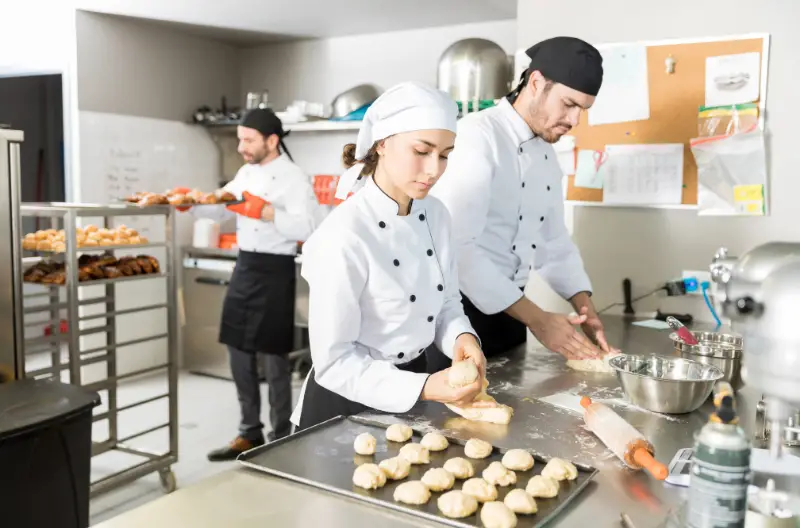
Importance of Mental Endurance for Pastry Chefs:
Managing High-Volume Orders: Pastry chefs often encounter busy periods with numerous orders to fulfil. Mental endurance allows them to remain composed and efficiently execute tasks without compromising quality.
Precision in Delicate Techniques: Pastry-making involves intricate techniques that require concentration and attention to detail. Mental endurance helps pastry chefs consistently maintain precision in decorating and crafting delicate pastries.
Coping with Stress and Time Constraints: Meeting deadlines and handling stressful situations are expected in the fast-paced kitchen. Mental endurance enables pastry chefs to stay calm, think critically, and make informed decisions under pressure.
Guidelines to Develop Mental Endurance:
Practice Mindfulness and Meditation: Engage in mindfulness exercises and meditation to improve focus and maintain a clear, calm mind during busy workdays.
Set Realistic Goals: Break down tasks into manageable goals and build confidence and motivation by celebrating achievements.
Develop Resilience through Challenges: Embrace challenges as learning opportunities and develop resilience by overcoming obstacles in the kitchen.
Take Breaks and Self-Care: Prioritize self-care by taking short breaks during work hours and ensuring adequate rest outside of the kitchen to recharge mentally.
Leadership to Inspire, Guide and Streamline Workflow.
Senior pastry chefs or those in managerial roles need strong leadership skills to guide their teams and foster a collaborative environment.
Leadership for a pastry chef, involves the ability to inspire, guide, and motivate kitchen staff, fostering a positive and efficient work environment to achieve culinary excellence.
Importance of Leadership for Pastry Chefs:
Effective Kitchen Management: Strong leadership ensures clear communication, the delegation of tasks, and streamlined workflow, optimising kitchen operations and productivity.
Mentoring and Development: Pastry chefs with leadership skills can mentor junior staff, nurturing their talents and guiding them towards professional growth and success in the pastry field.
Maintaining High Standards: Leadership fosters a culture of excellence in the kitchen, encouraging teamwork, discipline, and a commitment to delivering exceptional pastries consistently.
Guidelines to Develop Leadership:
Lead by Example: Demonstrate professionalism, dedication, and a positive attitude in the kitchen, inspiring and influencing others through your actions.
Effective Communication: Develop strong communication skills to convey instructions, provide feedback, and listen to the concerns and ideas of your team members.
Encourage Collaboration: Foster a collaborative and supportive environment where team members feel comfortable contributing their ideas and working together towards shared goals.
Continued Learning: Pursue leadership development programs, workshops, and courses to refine your leadership style and techniques, staying adaptable and effective in managing your team.
Strategic Thinking to Analyse, Plan, and Make Good Decisions.
Strategic thinking is a crucial soft skill for a pastry chef, involving the ability to analyse, plan, and make informed decisions that optimise pastry preparation processes and enhance culinary outcomes.
Importance of Strategic Thinking for Pastry Chefs:
Efficient Resource Utilisation: Strategic thinking enables pastry chefs to optimise ingredient usage, minimise waste, and manage kitchen resources effectively, leading to cost-efficient operations.
Menu Development and Innovation: Pastry chefs with strategic thinking can curate menus that balance customer preferences, seasonal ingredients, and emerging trends, appealing to a diverse clientele and staying competitive.
Problem-Solving and Adapting to Challenges: Strategic thinkers can anticipate potential challenges and develop contingency plans, ensuring smooth pastry preparation and the ability to adapt quickly to unforeseen situations.
Guidelines to Develop Strategic Thinking:
Analyse Past Performance: Evaluate past pastry offerings, sales data, and customer feedback to identify patterns and insights that inform future strategic decisions.
Stay Updated on Industry Trends: Keep abreast of baking and pastry trends, market dynamics, and customer preferences to guide strategic menu development and innovation.
Collaborate and Seek Input: Engage in discussions with colleagues, chefs, and customers to gain different perspectives and ideas, fostering a collaborative approach to strategic decision-making.
Set Long-Term Goals: Establish clear, achievable long-term goals for your pastry career or business, and outline the steps needed to accomplish them, guiding your strategic direction with purpose and vision.
Productivity for Optimal Performance and Meet High Demands.
Productivity is an essential soft skill for a pastry chef, involving the efficient utilisation of time, resources, and skills to achieve optimal results in pastry preparation.
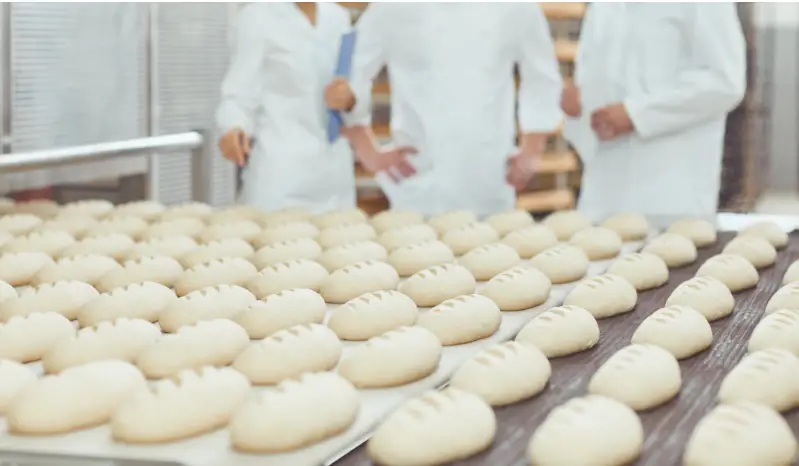
Importance of Productivity for Pastry Chefs:
Meeting High Demand: In fast-paced kitchens, productivity ensures pastry chefs can handle high-volume orders and satisfy customer demands without compromising quality.
Effective Time Management: Productivity skills enable pastry chefs to allocate time effectively, maintaining a smooth workflow and meeting pastry-making deadlines.
Consistent Quality: Being productive allows pastry chefs to focus on each step of the pastry-making process, ensuring consistent quality in their creations.
Guidelines to Develop Productivity:
Organise Workstations: Set up workstations with all necessary tools and ingredients within reach, reducing time spent searching for items during pastry preparation.
Time Blocking: Allocate specific time slots for each pastry-making task, adhering to a schedule to maintain a steady and efficient workflow.
Eliminate Distractions: Minimize distractions in the kitchen and focus on the task at hand, promoting greater concentration and productivity.
Continuous Improvement: Regularly assess and evaluate your pastry preparation methods, seeking opportunities to optimise efficiency and productivity and implementing improvements as needed.
Willingness to Learn and Improve Skills Continuously.
A willingness to learn is a vital personal trait for a pastry chef. It encompasses the eagerness to seek knowledge, embrace new techniques, and continuously improve their pastry-making craft.
Importance of Willingness to Learn for Pastry Chefs:
Skill Advancement: Pastry chefs who thirst for learning to stay updated with the latest culinary trends and techniques, elevating their skills and repertoire.
Innovation and Creativity: A willingness to learn fosters a culture of innovation, encouraging pastry chefs to experiment with novel ingredients and design concepts, leading to unique and cutting-edge creations.
Adaptability: Continuous learning enables pastry chefs to adapt to evolving customer preferences, dietary trends, and industry practices, ensuring their pastries remain relevant and appealing.
Guidelines to Develop Willingness to Learn:
Curiosity and Research: Cultivate a curious mindset and regularly research new pastry recipes, techniques, and culinary publications to expand your knowledge.
Attend Workshops and Seminars: Participate in baking and pastry workshops, seminars, and demonstrations to gain insights from experienced chefs and industry experts.
Embrace Feedback: Welcome feedback from customers, colleagues, and mentors, using it for improvement and growth.
Experiment and Challenge Yourself: Step out of your comfort zone by experimenting with innovative flavours, textures, and presentations, challenging yourself to push the boundaries of your pastry expertise.
Culinary Trends Research to Include New Trends in Designs.
A pastry chef’s drive to stay informed about baking and pastry trends is an essential quality. It involves the active pursuit of knowledge and awareness of emerging techniques, flavour profiles, and innovative presentations in the pastry world.
Importance of Staying Informed about Baking and Pastry Trends for Pastry Chefs:
Culinary Innovation: Being up-to-date with baking and pastry trends allows pastry chefs to incorporate innovative and trendy elements into their creations, captivating customers with unique offerings.
Meeting Customer Preferences: Knowledge of current trends helps pastry chefs understand evolving customer preferences and adapt their menu to cater to contemporary tastes.
Competitive Edge: Staying informed about trends keeps pastry chefs ahead of the competition, allowing them to stand out and remain relevant in the ever-changing culinary landscape.
Guidelines to Develop Staying Informed about Baking and Pastry Trends:
Continuous Learning: Research baking and pastry publications, websites, and cookbooks to stay informed about the latest trends.
Attend Workshops and Events: Participate in baking and pastry workshops, seminars, and culinary events to learn from industry experts and gain insights into current trends.
Follow Social Media and Online Communities: Engage with baking and pastry communities on social media platforms to access real-time updates and discussions on trends.
Experiment with New Techniques and Ingredients: Incorporate trendy techniques and ingredients into your pastry creations, experimenting with innovative combinations to refine your skills and stay ahead of the curve.


